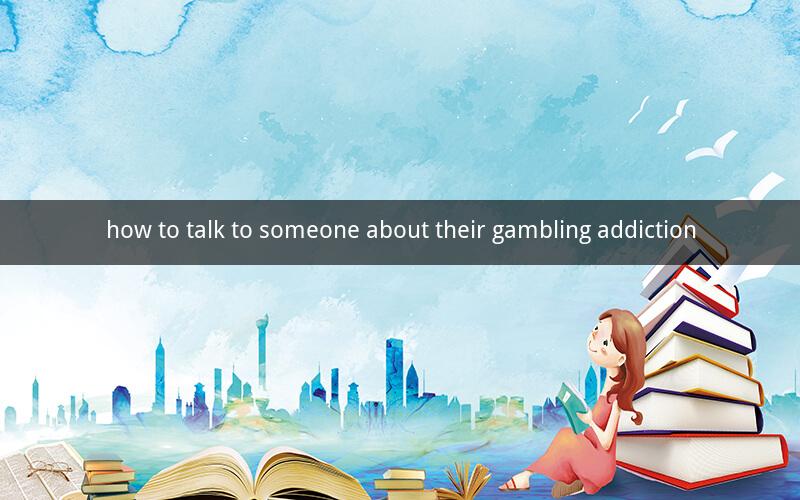
How to Talk to Someone About Their Gambling Addiction
Table of Contents
1. Understanding the Problem
2. Preparing for the Conversation
3. Timing and Setting
4. The Conversation Itself
5. Active Listening
6. Expressing Concern
7. Offering Support
8. Addressing Denial
9. Exploring Treatment Options
10. Maintaining the Relationship
1. Understanding the Problem
Gambling addiction is a serious issue that can have profound effects on an individual's life, including their relationships, finances, and mental health. It is essential to understand the nature of the addiction before attempting to talk to someone about it.
2. Preparing for the Conversation
Before initiating the conversation, gather information about gambling addiction, including its signs and symptoms, the impact it can have on a person's life, and available treatment options. This will help you approach the conversation with knowledge and empathy.
3. Timing and Setting
Choose a quiet, private setting where the person feels comfortable and safe. Ensure that the conversation takes place at a time when they are not under stress or distracted.
4. The Conversation Itself
Start the conversation by expressing your concern for the person's well-being. Use "I" statements to avoid sounding accusatory or confrontational. For example, "I'm worried about you and your gambling habits."
5. Active Listening
Give the person your full attention during the conversation. Listen to their perspective and validate their feelings. Avoid interrupting or rushing the conversation.
6. Expressing Concern
Express your concerns about the negative consequences of their gambling addiction. Use examples of how their behavior has affected you and others around them. For instance, "I've noticed that you've been spending a lot of time gambling, and it's causing stress in our relationship."
7. Offering Support
Let the person know that you are there to support them through this difficult time. Offer to help them find professional help or attend support groups with them. For example, "I want to help you get the help you need. Would you be interested in attending a Gamblers Anonymous meeting with me?"
8. Addressing Denial
Be prepared for the possibility that the person may deny their addiction. Remain calm and non-judgmental, and avoid confrontational language. Instead, focus on the consequences of their behavior and the importance of seeking help.
9. Exploring Treatment Options
Discuss the various treatment options available for gambling addiction, such as therapy, support groups, and residential programs. Encourage the person to research these options and choose the one that best suits their needs.
10. Maintaining the Relationship
It is crucial to maintain a supportive and understanding relationship with the person throughout their recovery journey. Continue to offer your support, and be patient as they work through their addiction.
FAQs
1. What if the person becomes defensive during the conversation?
- Stay calm and empathetic. Acknowledge their feelings and try to understand their perspective. Avoid getting defensive yourself.
2. How can I encourage someone to seek help if they are resistant?
- Offer information about the benefits of treatment and share success stories. Be persistent but patient, and let them know that you are there for them.
3. Should I confront the person about their gambling addiction in front of others?
- No, it is best to have the conversation in a private setting to avoid embarrassment or shame.
4. What if the person is not ready to talk about their addiction?
- Respect their feelings and give them space. Let them know that you are there when they are ready to talk.
5. How can I support someone during their recovery from a gambling addiction?
- Offer your support by attending support groups with them, helping them find treatment, and being patient as they work through their recovery.
6. What are some signs that someone has a gambling addiction?
- Signs include hiding their gambling activities, lying about their gambling habits, spending excessive amounts of time and money on gambling, and experiencing financial, emotional, and relationship problems due to gambling.
7. Is it possible for someone to recover from a gambling addiction?
- Yes, it is possible for someone to recover from a gambling addiction with the right treatment and support.
8. How can I help a family member who is struggling with a gambling addiction?
- Educate yourself about gambling addiction, offer support, and encourage them to seek professional help. Be patient and understanding throughout the process.
9. What are some effective treatment methods for gambling addiction?
- Effective treatment methods include cognitive-behavioral therapy, support groups, and residential programs.
10. How can I maintain a healthy relationship with someone who has a gambling addiction?
- Communicate openly and honestly, offer support, and set boundaries to protect yourself from the negative consequences of their addiction.